Buying a new horse is a huge financial, physical and emotional commitment. When making substantial purchases such as these beautiful beasts, the right choice is crucial. Horses are powerful beings that require a lot of your attention.
The most important aspect to consider when buying a horse is their temperament. A beginner equestrian will want a calm and docile horse with riding experience. Ask the seller about the horses legal papers and their history and take into account the ongoing work and expenses involved with owning a horse.
You should never buy a horse on a whim. Some horse owners compare the commitment of buying a horse as akin to having a baby. You might assume it’s the same as owning a dog. This decision can change your life significantly, even a new puppy is not going to require as much of your space, time and money as your new equine best friend.
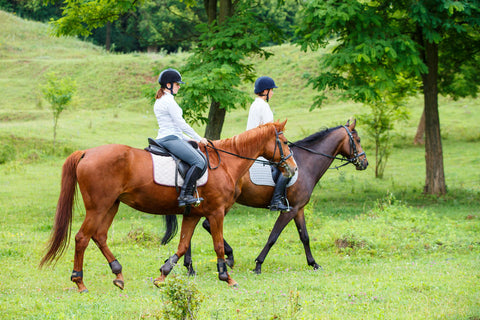
Learn to canter before you gallop
These beautiful and sensitive creatures pull on our heartstrings and it’s easy to be drawn to their majestic power. For that reason, we have devised our practical horse buying checklist to help you make a wise and informed purchase.
Not everyone has what it takes to raise horses. Besides being a huge time commitment and an emotional and physical responsibility they are also very good at eating into our finances.
Before you make the decision to invest in a horse, get some experience if you haven’t already.
- You can enrol in regular riding lessons with a professional and reputable trainer.
- Volunteer or work at some local stables to get used to the equestrian lifestyle.
- Consider leasing a horse for up to six months. Some horse owners lease their horses for a fixed fee or a portion of the horses expenses in exchange for riding time.
If you have invested significant time in all of the above and none of them have hindered your desire to become a full time horse owner, then it’s time to start looking at the important things you should consider before finding your horse!
What should you look for when buying a horse?
The temperament of a horse is the single most important factor to consider when deciding on which one to bring home. Especially as a first horse owner, you will want them to be kind, gentle and calm.
There’s no doubt that owning a horse is a learning curve in itself. Having a horse that is tolerant and forgiving of your misgivings will improve your horse ownership experience significantly. If they bite or kick and you don’t have experience with this, you will have work on your hands to counteract these bad habits.
Trust your instinct when choosing a horse. You will likely notice if one horse is calm and gentle versus one that is nervous and thrashing. Watch out for these characteristics when visiting the horse for the first time:
- They walk calmly and quietly in sync with the seller.
- They wait patiently to be tied up
- They stand still for grooming and saddling
- They wait quietly for the seller to tighten the girth and mount
- They are not distracted during the ride with the seller
What to ask before you buy a horse?
Horse ownership can be such a joy. That’s why extensive research, smart buying strategies and expert advice is integral to leading you towards the perfect match. When you’re looking at horses you can ask the seller as many questions as you like. You’ll want to find out the history of the horse, their training and riding experience, the temperament and personality of the horse and any health issues they may currently have or have previously had.
Here’s a few to get you started:
- Why are you selling this horse?
- Do you have the original registration certificate of the horse?
- How long have you owned the horse?
- Where did you get them from?
- Do you know the history of this horse?
- Is there any history of abuse or neglect, injury or illness?
- Who rode the horse while you owned them?
- Have they ever been leased out or ridden as a lesson horse?
- How would you describe their personality?
- How is their health?
How much should I spend on my first horse?
To determine how much you should spend on the initial purchase of your horse, consider what you want to achieve with your horse. If you want to go for fun rides with the opportunity to compete locally you should be able to find a suitable horse for around $5000 (depending on your area). If you aspire to compete more seriously, we would recommend consulting with your equestrian instructor for ball park purchase figures.
You can always begin with a safe starter horse to help you to learn basic horsemanship. Then, if you decide at a later date to compete on a national level or up, you can invest in a horse to get you there.
Remember that the initial purchase of your horse is just a small percentage of the ongoing expenses of owning a horse.
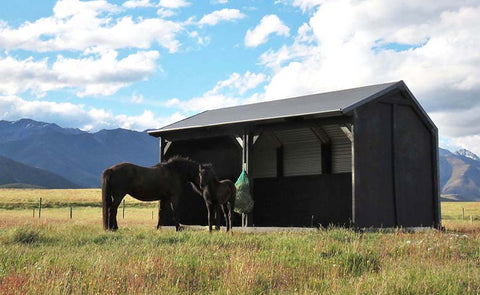
What are the basic needs of a horse?
Horses have four basic needs for survival, as do we all - water, food, companionship and shelter. Of course, there are many variables within these basic needs that you can adjust to raise a happy and healthy horse.
Water - On average horses drink 30-50 litres of water per day so make sure your horse has access to fresh, clean water at all times. Hydration is essential to their overall health. During the warmer months they’ll likely drink more due to the heat and in the cooler months there’s the possibility of it freezing over so you'll need to check their water source several times a day.
Food - Horses are herbivores with a unique digestive system. They are designed to spend their days grazing on pasture, consuming little and often. The most natural diet of a horse is pasture grass and tender plants and the bulk of their diet should consist of this. Frequent or constant access to hay or grasses helps to keep your horse's digestive system working effectively.
Companionship - Horses are herd animals and take great comfort as part of a group. In the wild they would be much more vulnerable by themselves and much safer in a herd. Some horse personalities may clash but generally, they will be much happier socialising and living with other horses.
Shelter - Horses are pretty hardy species and they cope well with both the heat and cold through body temperature regulation. However, to preserve their health and wellbeing they will still need a safe and secure shelter to escape the elements.
Outpost buildings horse stables are extremely strong and secure, designed with the comfort and safety of you and your horses in mind. Our horse shelters come in a range of different sizes and you can add gates and bay dividing rails to create holding stalls. . We have many different designs to choose from:
- Paddock shelters - These kitset buildings are designed to be placed alongside pastures and are great for giving your horses protection from the elements. They’re also relocatable, so you can move them wherever you want, even after construction.
- Shelter with tack room - For easy access to feed, saddles, and other equine equipment. A tack room attachment to a typical shelter provides protection for both your horses and your supplies.
- Hunter stables - Our hunter stables are some of the toughest and most durable horse shelters. They offer various sized lodgings for your horses: a great option for those who want plenty of room for their horses.
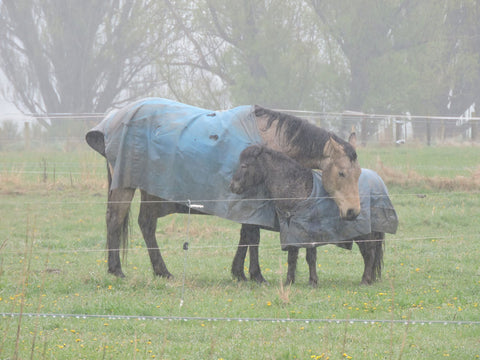
What age horse should I buy?
It may be tempting to buy a brand new foal as your first horse so you can grow and learn together. However,quite the opposite will be your best bet. This is the beginning of your horse ownership journey and it will be much easier to take on a horse that is already trained and experienced.
Leave the rearing to the professionals!
If you are a beginner or if you’re buying a horse for your child, you don’t want to invest in one too young. Younger horses tend to be more lively and lack experience and training with riders. A good rule of thumb is that the age of the child and the horse's age should add up to 20 years. A lot of horses live to be 30+ and older horses generally have much better temperaments than younger ones.
Age doesn’t always come with training and experience. If a horse is advertised as “green” or “needs finishing” regardless of age, a beginner will want to steer clear of these, even if the price is right. Choose a horse who is already doing what you want to do with them, such as trail riding or show jumping.
What is a good first horse?
Similar to deciding on a breed of dog that will fit well into your family and your lifestyle, the same can be said for choosing the right equine breed. Choosing between breeds could be the difference between finding a lifelong family member and giving up on the equestrian lifestyle altogether.
As with dogs, horses have been selectively bred to develop specific characteristics. Whether for calm and docile temperament for beginners and children or skilled and fast for shows.
Although there are calm and docile horses in every breed, there are specific breeds that fall into the former category that you might want to look out for:
Morgan - An excellent choice for a family horse and pretty forgiving for first time riders. Known for being kind, courageous and healthy, Morgan’s are eager to please and will work hard to figure out what their rider is asking of them. They are muscular and sturdy usually found in bay, black or chestnut colourings.
Quarter - A great beginner horse is the American Quarter horse with their easy temperament. These are reliable and hard working horses always willing to go the extra mile for their riders. They have solid hooves and a frame that can endure long days under a saddle. They have a finely chiselled head and their colourings can vary considerably.
Paint - These horses have a calm, easygoing nature and are social animals. You can form deep bonds with these horses and they do well with children. This intelligent breed is also easy to train. They have muscular bodies, strong hindquarters and a distinctive coat pattern.
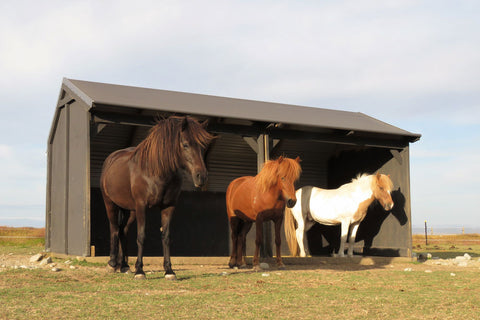
How much is it to maintain a horse per year?
The initial cost of your horse, (plus the pre-purchase exam, which we highly recommend) isn't the only cost you will incur in the first few months of owning a horse. Of course you’ll need to treat your horse to a safe and secure shelter and invest in good quality riding gear. This is all before we’ve even discussed the basic ongoing costs of food, bedding, grooming equipment, supplements, medication and potential vet bills.
This clever and insightful article from horsetalk outlines in full detail the cost of keeping a horse and compare it to running a car on a yearly basis. They interviewed experienced horse owners to gain insight into the sorts of costs their horses have set them back yearly. They talk about the huge difference in costs between a beginner horse and a show horse, the variables of certain aspects of owning a horse such as savvy gear purchases and vet bills, while discussing the value a horse can appreciate if trained well.
How much work is owning a horse?
Before you buy a horse, the most important question you need to ask yourself is do you have the time to look after them. Owning a horse is a 365 day a year job. They require daily care throughout the seasons. If you have the ability to keep your horse on your own property, the absolute minimum amount of time you will need to set aside for them each day includes:
- Feeding and checking drinking water at least twice a day - 10 minutes
- Visually checking for signs of illness and injury - 5 minutes
- Daily hoof cleaning - 5 minutes
This can set you back 20 minutes of your day. However, this is the absolute minimum time you will need to spend each day on one horse. Each of these tasks can take a lot longer depending on certain factors. The winter months could have you breaking ice in buckets, hauling hoses to make sure your horses are watered, maintaining pathways to feeders and gates to ensure the safety of everyone. Horses can also damage their stables and equipment which means you’ll need to allocate extra time for maintenance.
The minimum time you spend looking after your horse will be in addition to any training, riding, grooming or driving you have to do.
If you choose to board your horse and pay for the convenience of full care you may not have to account for the everyday horse management. That convenience can come with a hefty price though, and can set you back thousands of dollars every year.
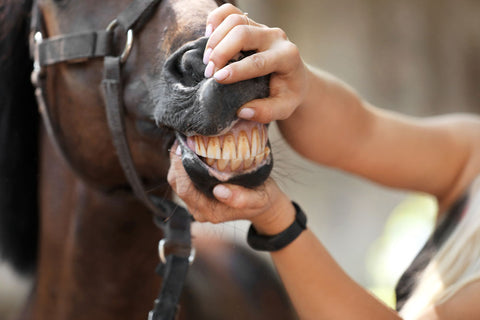
Should you get a vet check before buying a horse?
You should get a pre-purchase exam or a vet check before you commit to buying a horse. This will reassure you of any health issues. It’s also a great way of learning more about your horse from a professional perspective. Consult with the vet for a full insight into the horse's health, they should also have an idea of their age (if you don’t know already) and their life expectancy.
Speak to your local vet about prices of a pre-purchase exam. They come in the form of a basic check (or partial exam) or a full comprehensive exam. They can range from $400-$2000. A full exam can include x-rays, blood tests and ultrasounds.
If you’re looking for the best shelters for your new horse, look no further than Outpost Buildings. Feel free to get in touch with one of the team here.




